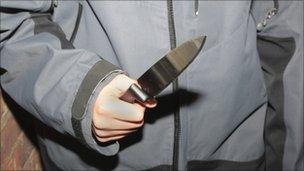Schools in Wales gain power to search for weapons
- Published

Pupils can be searched when there are reasonable grounds for suspicion
Schools in Wales have been given the power to screen and search pupils for weapons such as knives.
Teachers have responded by calling for clear guidance on the new regulations to ensure that they know precisely what they can and cannot do.
Schools and further education colleges now have the extra authority under the Violent Crime Reduction Act.
Education Minister Leighton Andrews said schools had to understand how to use their new abilities.
Mr Andrews has signed an order under the 2006 Act bringing the regulations into effect.
He said: "It is important schools and colleges are safe places to ensure the best possible educational environment for our young people.
"Views were sought on the new powers as part of the 'safe and effective intervention' guidance consultation which closed in February. There was a great deal of support for the powers.
"We must now make sure schools and colleges understand these new powers and how to use them."
The guidance for staff - 'Safe and effective intervention - use of reasonable force and searching for weapons', external has been published on the assembly government website.
On screening and searching, the guidance says schools can screen pupils without consent with a "walk-through or hand-held metal detector".
It says pupils can be searched when there are reasonable grounds for suspecting they have a knife, an offensive weapon, such as a gun, broken bottle, or baseball bat.
On the use of "reasonable force" it says: "The use of force should only be a last resort, schools should minimise the possibility of force being needed.
"However, this may not always be possible and in such circumstances staff need to be aware of sensitivities associated with any form of physical contact with pupils.
"Schools should never seek to inhibit the ability of staff to use force by adopting a 'no contact' policy. The power to use force helps ensure pupil and school safety and the risk with a no-contact policy is that it might place a member of staff in breach of their duty of care towards a pupil, or prevent them taking an action needed to prevent a pupil causing injury to others."
It also says controlling students can mean "either passive physical contact (eg standing between pupils or blocking a pupil's path) or active physical contact (eg leading a pupil by the hand or arm, or ushering a pupil away by placing a hand in the centre of the back)".
It adds: "When members of staff use 'restraint' they physically prevent a pupil from continuing what they were doing after they have been told to stop. Restraint techniques are usually used in more extreme circumstances, such as when two pupils are involved in a fight and physical intervention is needed to separate them".
The guidance says there is "no legal definition of when it is reasonable to use force" and "that will always depend on the precise circumstances of individual cases".
Stewart Williams of the NUT said: "We welcome the new powers but we have to remember that teachers are not law enforcement officers... they are there to teach, and we need guidelines on how to put these new powers into force.
"I think every school will need to put their own policies into place. It all depends on the senior management team and the pupils at the school.
"The majority of schools in Wales are safe places to learn. There's only a very small minority where problems arise and it's in those areas where teachers need these guidelines.
"I would call for more detailed guidelines for teachers so they understand exactly when and what they can do and they do not put themselves in the position where they can be accused of any type of assault or any other accusation."
- Published31 October 2010
- Published7 July 2010
- Published7 July 2010